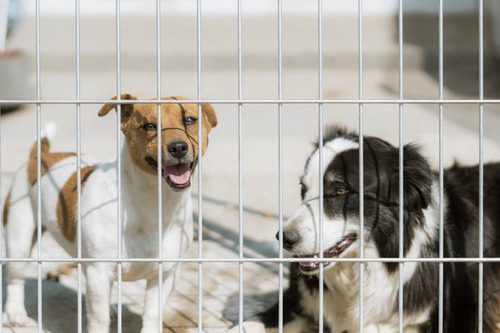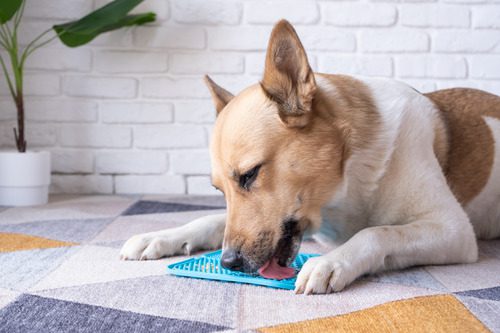What Pet Parents Need to Know About Kennel Cough
If your dog has ever spent time at a daycare, boarding facility, grooming salon, or dog park, you’ve probably heard the term “kennel cough.” While the name might sound harmless, this upper respiratory infection is highly contagious and can spread quickly among dogs in shared spaces. This blog will take a closer look at the causes, symptoms, and treatment options for kennel cough, and explain when it’s time to call your veterinarian at Best Friends Veterinary Hospital.

What Is Kennel Cough?
Kennel cough, also known as canine infectious respiratory disease complex (CIRDC), is a respiratory condition that affects a dog’s windpipe and voice box. It can be caused by several different infectious agents, including viruses and bacteria. The most common culprit is a bacterium called Bordetella bronchiseptica, which is why some people refer to the condition simply as “Bordetella.”
This illness can range from mild to severe, depending on the dog’s age, overall health, and whether additional infections are present. Kennel cough is especially common in places where many dogs are housed together or interact closely, hence the name. However, dogs don’t need to stay in a kennel to get it. A trip to the groomer, a training class, or even a shared water bowl at the dog park could be enough for exposure.
What Causes Kennel Cough in Dogs?
Kennel cough doesn’t come from just one source. It’s often a combination of viruses and bacteria working together to weaken a dog’s respiratory system. These organisms are transmitted through respiratory droplets, such as when a dog coughs, sneezes, or shares objects like toys, bowls, or bedding.
Common Infectious Agents Involved
- Bordetella bronchiseptica (bacteria)
- Canine parainfluenza virus
- Canine adenovirus type 2
- Canine influenza virus
- Mycoplasma (a type of bacteria)
Once a dog breathes in or comes into contact with one or more of these agents, they may develop symptoms within a few days. Dogs who are stressed, unvaccinated, or have weakened immune systems are at higher risk of developing kennel cough after exposure.
How Does Kennel Cough Spread?
Kennel cough spreads very efficiently from dog to dog, primarily through airborne droplets. It can also be transmitted by direct contact or by touching contaminated surfaces. Because it’s so contagious, outbreaks often happen in environments where dogs gather in close quarters.
Ways Kennel Cough Spreads:
- Nose-to-nose contact
- Coughing or sneezing near another dog
- Shared water bowls, toys, or bedding
- Human hands or clothing carrying the bacteria or virus
Even if a dog doesn’t seem sick, they can still pass on the infection. Some dogs remain contagious for weeks after their symptoms resolve. This is why it’s important to be mindful of where your dog goes and who they interact with, especially if there’s been a recent outbreak in your area.
Symptoms of Kennel Cough to Watch For
Dogs with kennel cough typically develop a dry, honking cough that’s hard to miss. The sound is often compared to a goose honk and can be persistent. While the cough is the most recognizable sign, other symptoms can develop as the illness progresses. Common symptoms include:
- A loud, dry cough (often triggered by excitement or pressure on the collar)
- Sneezing
- Runny nose
- Watery eyes
- Mild fever
- Lethargy
- Decreased appetite
In mild cases, dogs usually continue to act normally aside from the cough. However, if your dog shows signs of fatigue, breathing difficulty, or refuses food or water, it’s time to contact your veterinarian. Puppies, seniors, and dogs with underlying health issues are more likely to develop complications.
How Is Kennel Cough Diagnosed?
When you bring your dog in for an exam at Best Friends Veterinary Hospital, your veterinarian will start with a physical evaluation and discuss your pet’s recent activities. They’ll ask questions like whether your dog has been around other dogs, visited a boarding facility, or started coughing after a recent groom.
Diagnostic Tools
- Listening to the lungs and airway
- Taking a complete history of exposure
- In some cases, X-rays to rule out pneumonia or other conditions
- Bloodwork or nasal swabs (if a more serious illness is suspected)
Kennel cough is often diagnosed based on symptoms and exposure history. Testing is usually reserved for more severe cases or when symptoms don’t improve as expected.
Potential Treatment Options for Kennel Cough
Most cases of kennel cough resolve on their own with supportive care. The main goal is to keep your dog comfortable and monitor for signs of worsening illness. Because kennel cough is typically caused by a virus or a combination of pathogens, antibiotics may not always be needed.
Treatment Approach
- Rest and reduced activity to allow the immune system to recover
- Cough suppressants or anti-inflammatory medications, if prescribed
- Avoiding irritants like smoke or strong fragrances
- Monitoring hydration and appetite
If your dog’s symptoms worsen or don’t improve after several days, your veterinarian may recommend further diagnostics or a change in treatment. Never give over-the-counter medications without veterinary guidance.
Can Dogs Be Vaccinated Against Kennel Cough?
Yes, vaccination can help reduce the risk of kennel cough. While no vaccine is 100% effective, it can significantly reduce the severity of symptoms and lower the chance of infection. The Bordetella vaccine is the most common, and it’s often recommended for dogs who frequent social settings.
Types of Vaccines
- Intranasal: Given into the nose for local immune protection
- Oral: Administered in the mouth
- Injectable: Given under the skin
Your veterinarian will help you decide which vaccine is best for your dog based on age, lifestyle, and health status. Dogs who visit groomers, daycares, or boarding facilities may be required to have this vaccine updated every 6 or 12 months.
How to Help Prevent Kennel Cough
While no method offers complete protection, there are steps you can take to minimize your dog’s exposure to kennel cough. These measures are especially important during outbreaks or when introducing your dog to a new environment.
- Keep your dog up to date on their Bordetella and other core vaccines
- Avoid overcrowded play areas or facilities with poor ventilation
- Ask about health protocols at daycares, kennels, and grooming salons
- Don’t allow your dog to share water bowls or toys with unfamiliar dogs
- Isolate your dog from others if they’re showing signs of illness
Prevention is especially important for dogs with compromised immune systems, such as puppies, seniors, or dogs undergoing medical treatments.
Why Kennel Cough Awareness Matters
Understanding kennel cough and how it spreads empowers you to make better decisions for your dog’s health. While the illness is common, it doesn’t need to catch you off guard. Knowing the symptoms to look for, how it’s transmitted, and when to contact your veterinarian can make a meaningful difference in your dog’s recovery and wellbeing. If your dog is coughing or you need to update their vaccinations, our team at Best Friends Veterinary Hospital is here to help. Call one of our locations or book an appointment online today. We’re happy to answer your questions and provide the care your pet deserves.
Recent Posts
About Best Friends Veterinary Hospital
Our veterinarians and staff warmly welcome dogs, cats, and a variety of exotic pets as patients here at our animal hospital, and we offer a host of services to give your unique family member a lifetime of excellent care.




